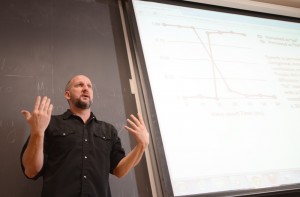The sound of a bow pulling across a violin string fills students’ ears in a Royce Hall classroom.
Making the sound with no other instruments but his voice, Greg Bryant, a communication studies professor at UCLA, explained to his class how people tend to categorize certain sounds.
Bryant currently teaches classes on the connection between music and language and conducts research focused on the evolution of communication, particularly how humans interpret or react to different sounds.
He said he found his calling while writing a paper on the connections between the acoustic properties of speech and music for a psycholinguistics class as an undergraduate at San Francisco State University. He said he was so inspired that he continued to work on the paper for a year after he turned it in, eventually presenting it in his first talk at an American Association for the Advancement of Science conference.
“Things that I learned in that paper are things that I mention in class to this day,” Bryant said. “I found something that I was truly interested in. It really struck a basic chord within me, no pun intended.”
Bryant said his enthusiasm for music can be traced back to his family. Both his older brother and father were music lovers, and since his father was a major stereo enthusiast, he became involved in stereo as well and has been playing guitar since high school.
Although he loved music, he did not want to produce music as a full-time career.
“I’ve always been into music, but I didn’t think about pursuing a career in music particularly because I was more about playing in bands,” Bryant said. “I didn’t want to be a professional musician. I didn’t want to make something I loved to be my job because that’s the perfect way to kill it.”
Bryant said he continues to play guitar every day, and he recently performed his first solo at an international live music festival in Santa Cruz, Calif.
His research allows him to enjoy music, but still lets him keep enough distance from what he really loves to do, Bryant said. He now teaches upper division classes focused on the evolution of vocal communication and psycholinguistics.
By demonstrating sounds such as different instruments or the suspenseful music in the movie “Psycho” with his own voice and cracking jokes during lecture, Bryant said he tries to provide an environment that students find relaxing but still intellectually demanding.
“He definitely brings a new spin on teaching material. I don’t feel like he’s teaching but (he’s) talking to us. There’s no difference between the classroom and a coffee shop,” said Jonathan Umanzor, a fourth-year political science student who is in one of Bryant’s classes.
In past years, Bryant has focused on studying traditional connections between language and musical sounds.
For instance, one of Bryant’s past research publications focused on human reactions to music with distorted sounds that are often made by animals in fear or under duress.
The objective was to see if excitement levels and ranges of feelings were affected by sound, and later, in a second trial, if adding visuals would affect the subjects’ responses.

Brandon Jackson, a third-year communications studies student, is currently one of Bryant’s undergraduate research assistants. He is working on a study in which subjects read, listen and make judgments on what they find funny from what they see and hear on a computer.
Bryant’s latest work explains how convergence of speech rates in conversation predicts cooperation among individuals.
“There’s something about our ability to coordinate action that unconsciously motivates us to continue our relationship with the person,” Bryant said. “I’m interested in how we are similar to other animals and how we’re unique as a species.”
Bryant is now waiting on approval for a new study that Jackson will be heading about physical responses to sounds. The study will involve prompting males to say certain sentences with different emotions and seeing if certain factors, such as their physical strength, are related to the sound production of their voices.
Studying sounds has become Bryant’s career, and making music continues to be his favorite hobby.
“I’ve been listening to music pretty seriously ever since I was a little kid,” Bryant said, grinning. “I’ve always been a sound guy.”
